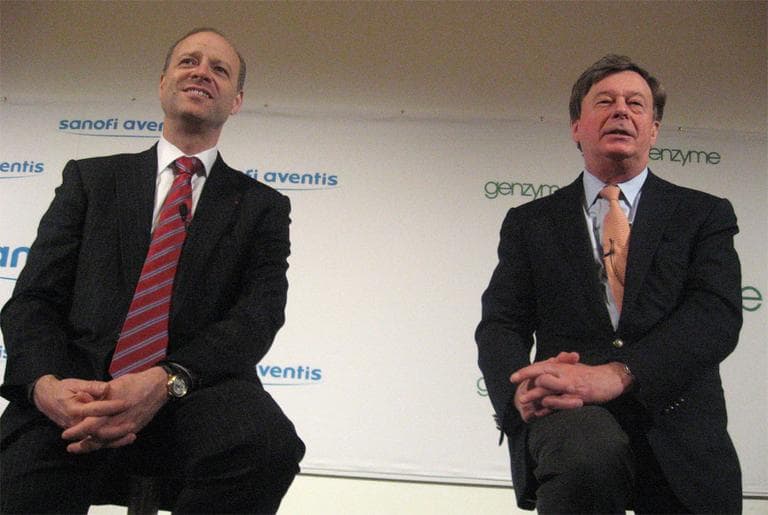Advertisement
Drug Maker Sanofi-Aventis To Buy Genzyme For $20B
ResumeThe nine-month-long courtship of Genzyme is finally over. The Cambridge-based bio-tech company announced Wednesday that French drug maker Sanofi Aventis has agreed to buy Genzyme for more than $20 billion, or at least $74 a share. It could end up doling out even more money, depending on how well one of Genzyme’s up-and-coming drugs sells.
WBUR's business and technology reporter Curt Nickisch has been following the story and joined Morning Edition Wednesday.

Bob Oakes: First the selling price, Curt, $20 billion-plus. Is Genzyme — Massachusetts' largest bio-tech company — getting paid what it’s worth?
Curt Nickisch: It's definitely getting paid a lot closer to what it said it was worth, as opposed to what Sanofi first offered. Of course, we'll never know what Sanofi would have paid, but, by most accounts, Genyme's fetching a pretty good price. And some of it depends on how well this one drug does down the road.
For Sanofi-Aventis — the world's fourth largest pharmaceutical firm — why is it worth potentially more than $20 billion to get Genzyme?
Sanofi’s in trouble in terms of generic drugs. Bob, you know how the drug industry works, if you develop one you get a patent, basically a monopoly on something that its patients, pardon the expression, are dying to get, so you can charge a lot of money for that. But after the patent runs out, you basically are producing at cost, and that pipeline of new, lucrative drugs, has dried up.
So Joshua Schimmer, an analyst at the Boston equity research firm Leerink Swann, says this is where Genzyme comes in:
"Genzyme does have quite a number of attractive assets that synergize nicely with Sanofi. Premium-price products. High-margin products. These products address very important unmet medical needs, which is in part why they can be priced at such a high rate.
Bob, some of Genzyme's drugs sell for hundreds of thousands of dollars per patient, per year. The other things is Genzyme would give Sanofi a much stronger foothold in the U.S.
So, in addition to the sale price, what does Genzyme get out of the deal?
Well, besides shareholders cashing out, it's not totally clear what Genzyme gets from Sanofi. I mean what both companies will tell you now is that Sanofi brings a lot of international marketing, they have deeper pockets, so maybe drugs that Sanofi would have developed, but thought were too risky, it could now do.
But a lot of Genzyme employees say, "We're already a global company and we don't really need Sanofi."
There are thousand of Genyzme employees, 4,500 or so, in Massachusetts. What happens the them?
Well, they’re not totally thrilled, because it's not totally clear what's going to happen to them either. Who knows what Sanofi will do. No doubt there will be layoffs, especially if you're in marketing or finance, or in certain types of consulting for the company that Sanofi already has, you're not feeling too comfortable right now. Schimmer says, clearly there will be layoffs here:
We don't have a lot of clarity at this point, in terms of how Genzyme as a Sanofi subsidiary would be managed — what that might mean for near-term job loss versus long-term job creation.
And the other thing is the company culture of these two organizations are also going to be really different. Genzyme, even though it was a big bio-tech company, it still had this independent streak, different departments work differently, and it's not clear how that's going to merge with this French international conglomerate, how those cultures are going to meld.
And so, the good news if you're a Genzyme employee is that you've had nine months to think about this, you know it was coming down the road for a long time. A lot of people have already left the company.
And we should probably say that Sanofi has put out a statement that says it will maintain "a sizable presence in the Boston area," but we don't know what that means.
Yeah, Genzyme has a great building here as this manufacturing plant in Allston. It doesn't make sense to move everybody. Sanofi wants Genzyme because it is here, in Cambridge, next to all these universities.
But, you can cut a lot of jobs out of the 4,500 people who work here and still maintain a sizable presence.
Last question Curt, and maybe the toughest of all: San’-oh-fee or Suh-noh’-fee?
Well he is Canadian, so maybe it came from speaking French when he went to school, as well. In French, it's Suh-no-FEE. So Seh-noh-FEE, San-noh-Fee, noh’-Fee-sa, nah-Fee. None of those Anglicized words really hits the mark. And I've talked to a lot of Genzyme employees. They don't even know what to call their boss.
This program aired on February 16, 2011.
